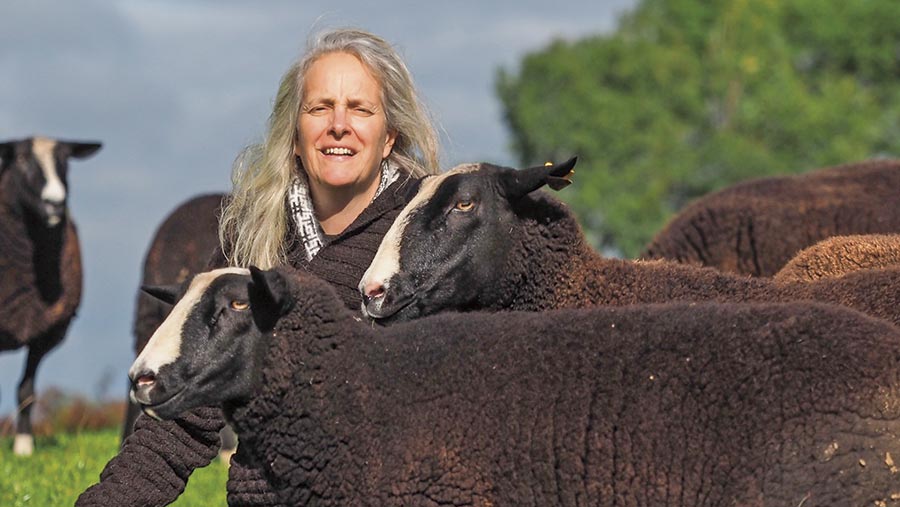Farming in Ireland: ‘A landscape steeped in history’
The View From Here is a Farmers Weekly series giving an insight into rural life from women around the world.
We catch up with people around the globe to get a sense of the joys and challenges of life in the countryside.
From New Zealand and France to the US and Uganda, we’ve heard about the practical realities of life.
See also: Farming in Canada: Snow drifts as tall as tree rows
Here, Suzanna Crampton gives us a glimpse of her life in Ireland.

© Celia Bartlett
What sort of farm do you live on?
A small farm in Ireland that has been in our family since 1800. I farm Zwartbles sheep, producing breeding stock, meat and wool, which I get spun and woven into blankets at a local woollen mill.
How involved are you with the farm?
I do all the work, with help on big jobs such as shearing or clearing up downed trees after winter storms.
What’s the farming/countryside typically like in your area?
Fields and farms are mostly enclosed with hedges and walls with modern big fields, broken up with sheep wire or electric fencing. Our farm is in the Nore River Valley in south County Kilkenny. This is fertile land – rolling hills with the Blackstair mountains rising in the distance.
The landscape surrounding me is steeped in history with a variety of round towers and square Norman towers. The farm community here is a mixture of beef, dairy, tillage and sheep farms, depending on the land type.
How poor or prosperous are farming families in your country?
Most of the land around here is excellent, so a viable living can be made on larger farms and efficient smaller ones. Many farms here have a second off-farm income from the husband or wife depending on the job and skills of the individual.
What’s the best thing about living on a farm?
A hardworking, but excellent lifestyle – clean air, wildlife, bird song, and being in touch with the real world of life and death, the beautiful and the ugly and feeling the seasons turning. Best of all for me is raising the animals I love to a high quality for meat and wool.
What’s the worst thing about living on a farm?
For me, it’s the weather and the financial challenges, but there are many who find that they can’t get away for any length of time as livestock is a 24/7 responsibility.
What’s the single biggest challenge farmers face where you are?
There is a very modern challenge for farmers in dealing with the growing urban-rural divide. The rapid uptake of social media and the spread of false information has led to an even more rapid growth of this division of reality and fiction.
Farming is like religion, there are many different kinds and many people are passionate about each one. It’s this passion that keeps people going through the tough times.
Here in Ireland, there are a huge number of different land types so there can be different approaches to growing the same type of crop or keeping the same type of livestock.
I’m a firm believer in the saying “to each their own” so I will listen and be interested–- but I don’t like it when people simply push their agenda or beliefs on me.
All farmers should consider themselves leaders in the farming community representing the whole. Every tweet or Facebook post could have thousands of views (read by what I call “curtain twitchers”).
Each one is educating the public and hopefully step-by-step, person-by-person you are narrowing the gap, building a bridge between urban and rural. It’s like drip-feeding a plant in a desert – that’s a better approach than throwing a gallon of water over it every once in a while.
Consumers must walk their talk and pay the real price of food, and, historically, food has never been cheaper. Cheap food comes at a cost and good food comes at a price.
What makes you laugh?
That would take book to write, as I love to laugh.
What makes you angry?
Animal cruelty, people who evade environmental responsibility, bullies, bigots, misogynistic men and women who tear down other women.
Is there equality between the sexes in your country?
No, but many would disagree and think there is. There are women with power or the ability to influence who are upholding systems that oppress women from the rural marginalised communities.
We as a community should be about empowering women, dismantling societal and culturally assumed limitations and taking apart oppressive systems, which in turn would be better for the community at large, not just women. It’s time for a bit more empathy, and a lot more solidarity.
Is farming well supported by your government?
It’s reasonably well supported, but more for those with plots of land, not small or hill farmers. I get just over €100 in government support every year and that is it.
Tell us something about yourself not many people know.
I am badly dyslexic, but with modern technology I am able to come across as being good at spelling. Being a dyslexic is great practice for a career in farming as one gets used to solving problems every day and being a great lateral thinker helps immensely.

